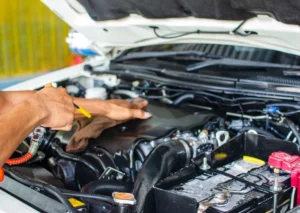Navigating the Current: Understanding Your Vehicle’s Electrical System

In today’s automotive world, the electrical system is the nerve center of your vehicle’s operations. From starting the engine to powering the air conditioning and infotainment systems, modern vehicles rely heavily on electricity. Understanding this intricate electrical network is crucial for both vehicle owners and auto service providers. In this blog post, we’ll take a deep dive into your vehicle’s electrical system, exploring its components, common issues, maintenance needs, and why professional auto service is essential for keeping the electrons flowing smoothly.
The Heart of Your Vehicle: The Electrical System
The electrical system in your vehicle is a complex network of components responsible for generating, storing, and distributing electrical power. Key aspects of your vehicle’s electrical system include:
- Battery
The power source that provides electricity to start the engine and operate electrical systems when the engine is off. - Alternator
The component that recharges the battery and generates electricity while the engine is running. - Starter Motor
Responsible for cranking the engine and starting the vehicle. - Wiring and Cables
Connectors, cables, and wiring that distribute electrical power throughout the vehicle. - Fuses and Relays
Devices that protect the electrical system and control the flow of electricity to various components.
Common Electrical System Issues
The electrical system can encounter various problems over time. Common electrical system issues include:
- Dead Battery
A battery that no longer holds a charge or fails to start the engine. - Starter Motor Failure
Issues with the starter motor can prevent the engine from cranking. - Alternator Problems
A malfunctioning alternator can lead to a dead battery and electrical system failures. - Faulty Wiring
Damaged or corroded wiring can cause electrical shorts and system malfunctions. - Blown Fuses
Overloaded circuits can blow fuses, disabling specific electrical functions. - Dim or Flickering Lights
Dimming or flickering headlights and interior lights may indicate electrical problems.
Why Professional Auto Service Matters
Professional auto service is vital for maintaining your vehicle’s electrical system. Here’s why:
- Diagnosis
Expert technicians can accurately diagnose electrical issues using diagnostic tools. - Quality Repairs
Professionals use quality replacement parts and follow manufacturer guidelines for repairs. - Preventive Maintenance
Regular electrical system checks can prevent issues before they occur. - Safety
Properly functioning electrical systems contribute to safe driving. - Complex Repairs
Complex electrical repairs require specialized knowledge and tools. - Longevity
Regular maintenance and timely repairs extend the life of electrical components.
Your vehicle’s electrical system is the invisible force that powers its modern features and ensures reliable performance. Understanding the components, common issues, and the importance of professional auto service for your electrical system is essential. Whether you encounter a dead battery, dimming lights, or other electrical troubles, seeking expert assistance ensures that your vehicle’s electrical system continues to run smoothly and reliably. By entrusting your electrical system maintenance and repairs to professionals, you’re not only ensuring your safety but also extending the life of this critical automotive network.











